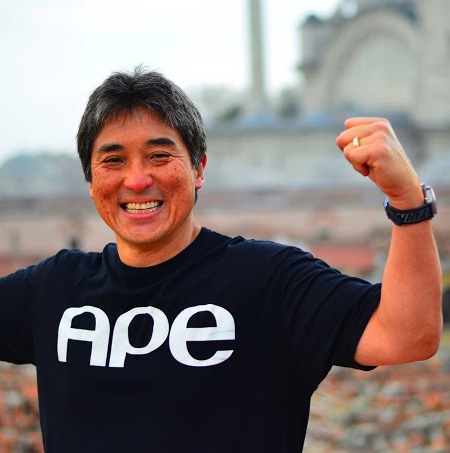
Sharing is Caring
Browse Categories
Guy Kawasaki On Self-Publishing, Marketing Your Book and Cheating by Tim Sanders
December 28, 2012
Last week, I spent some time with author and former Apple executive Guy Kawasaki. We talked about his latest book, APE: Author-Publisher-Entrepreneur--How To Publish a Book. He was inspired to write it after struggling through the process of putting out his own book (What the Plus!: Google+ For the Rest of Us) earlier this year. In this interview, he shares some advice for authors, along with his views about ethics in book marketing.
Tim: What are the biggest mistakes you see authors make in self-publishing?
Guy: First, self-published authors often don’t invest in professional copy editing. That is a huge mistake. I’ll tell you a story. I outsource copy editing, so, prior to turning in APE to my copy editor, about 60 people I know went through it. My co-author and I went through it 10 times each.
So, when I turned in a manuscript, I think it’s perfect. I’m thinking to myself, “This copy editor, is going to freaking have a heart attack. This is the rirst time in her career, that she’s received a manuscript with no mistakes.” So, she spends her week copy editing, and I say, “Okay, , how many errors did you get?” She says, “2,900.” I said, “That’s not possible.” She says, “Yes. You’re right. It’s really 1,500 because if I cut a word, and put in another word, or, I move the word, [Microsoft] Word counts that as two transactions? So, really, it’s more like 1,500.”
Just to recap: 60 people, plus 2 co-authors, went through this over and over, and we turned it in to a professional copy editor and got 1,500 mistakes.
Tim: So, the odds of an author using the Word spelling and grammar check tool on his manuscript, reading through it carefully, then publishing it without a lot of mistakes is zero. Next mistake?
Guy: Second, authors do not think through the total process of publishing a book. They don’t think about marketing it. They think that 80% of publishing a book is writing it. As soon as they finish writing it, then, they figure, “Oh, yes. I got to publish it. Now I just go to Kindle, and click on Upload, and it’s done, right?” It isn’t that simple. Then they ask themselves, “How do I get the word out?”
The problem with that is that they arrive at that brilliant insight after they published it, so they have no platform. What are they going to do? It’s too late. They need to blog, do social media, and start the process early to build a platform.
Tim: How far in advance do you think they should start that?
Guy: One year. I have spent two to three hours a day on social media since last year, building up my platform and talking about my new book. It’s a means to an end. My advice to the author is, you spend two hours a day writing and one hour a day on social media.
Tim: Should the author concentrate their sales on a specific retailer, say Amazon, to drive discoverability? Or, if they spread out their marketing buy to any one of these six places, do they end up burying themselves with low sales rankings?
Guy: We went with Kindle Select, so Amazon has a 90-day exclusive. Why did we do that? And, I think, based on the marketing benefits, plus the fact that I think Amazon is about 80% or 85% of the action. If you can get extra marketing benefits by going with the person who has 85% of the market anywhere, it doesn’t take a rocket scientist to figure out, you should probably do it.
Now, we have the ability because we kind of have done this before, on the 91st day, when the exclusive expires, we’ll do iBooks, Nook, and we’ll do Kobo. It’s extra business. But, for novice authors if they just stick with Amazon, they will be okay.
I mean, they’re going to, 80% of what they could do with one shot, so, if you make your books accessible with Amazon, it’ll be successful everywhere. But, if you try to make your success, book successful everywhere, and it’s not, adding one more online retailer isn’t going change things.
Tim: What about short cuts to being discovered, like buying your way on to the New York Times best seller list. That’ll get the word out, right?
Guy: This is totally immoral. Both the New York Times Bestseller List and the Wall Street Journal Best Seller List, are proxies for quality. Readers look at those lists and think, “This is on the list; it must be good book.”
After hearing a pitch about doing this [from a marketer], I went to my wife, and said, “Honey, I can absolutely guarantee that [my last major book] Enchantment will be a New York Times Bestseller. Absolutely guarantee it.” And, that has a lot of benefits. Now, you get introduced as New York Times Bestselling author, Guy Kawasaki. That has benefits, right? And, I asked, “Do you think I should do it?” And she said, “If your kids asked you how you became a New York Times Bestselling author, what are you going to tell them?” And, I said, “Okay. I get it.”
So, I didn’t do it. I refused to do it. And, if people knew all the bestselling authors, and famous people who have done it, they would be shocked. Absolutely shocked.
For more information on authors that buy their way on to the best seller list, read: Don't Get Fooled By the Fakes of Publishing

About Tim Sanders
Tim is a bestselling author and former Yahoo! executive with a mission to disrupt the traditional publishing and self-publishing industries and share knowledge with authors looking to publish and market high-quality books.
Follow @sanderssays